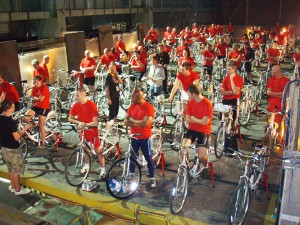4 Dec 2009
Essential Viewing: the Human Power Station
 For years in talks, I have talked about the idea of “energy slaves”, trying to translate the amount of energy used in the average family house into the number of people pedalling on bicycles that would be required to meet their needs. Thus far, no-one has ever actually tried to do it. Until last night, on a fantastic ‘Bang Goes the Theory’ programme on BBC TV, they put this to the test, and found it is way more than that. A brilliant programme, definitely worth watching. I have talked to people who found this one of the best programmes in terms of an awareness of energy that they have ever seen. You can view it for the next 7 days here.
For years in talks, I have talked about the idea of “energy slaves”, trying to translate the amount of energy used in the average family house into the number of people pedalling on bicycles that would be required to meet their needs. Thus far, no-one has ever actually tried to do it. Until last night, on a fantastic ‘Bang Goes the Theory’ programme on BBC TV, they put this to the test, and found it is way more than that. A brilliant programme, definitely worth watching. I have talked to people who found this one of the best programmes in terms of an awareness of energy that they have ever seen. You can view it for the next 7 days here.
Steve Atkins
4 Dec 3:26pm
Definitely worth a watch.
It made me wonder how much energy they used when they left the house. Did they go for a drive?
Would driving have amounted to more energy than the whole house used in a day?
cristiano
4 Dec 4:50pm
We can’t see it outside UK, can someone get the video for us?
Marcin Gerwin
4 Dec 4:58pm
Cristiano, I found an excerpt here:
http://www.youtube.com/watch?v=C93cL_zDVIM
cristiano
4 Dec 5:03pm
Ok great. thank you!
David Price
4 Dec 6:33pm
fantastic… here in the east BBC TV Inside Out featured Kate Edwards cob building course; see it here… http://www.bbc.co.uk/programmes/b0071mjk (last 10 minutes)
Judith N
4 Dec 9:25pm
Thanks, Marcin! What struck me is that now all those 78 bicyclists need showers. How’s THAT gonna work? 🙂 But this is really an awesome demonstration!
Beth Tilston
4 Dec 10:31pm
Just watched it and it was astonishing. A really really good teaching tool.
Matt Heins
5 Dec 2:09am
Wow.
Solar-heated shower looking better and better!
Out of curiosity, could from the UK that saw the whole program explain the set-up vis-a-vis how the bikes were generating the electricity? The Youtube clip didn’t really cover that.
The reason I ask is a bit off the point of the demonstration. It occured to me when watching that if each cyclist was hooked to their own generator (as it appeared) then that would be less efficient than the whole group being hooked to a single large one (through a system of gears)that would generate more watts per rotation.
The other bit that the clip didn’t cover is what other energy tasks those 78 cyclists could have powered. As in: How long could they have powered even a single incandescent light bulb?
As I said, all a bit beside the point, but I’m curious.
Thanks,
-matt.
BeBo
5 Dec 7:18am
Alas, we’re firewalled here in the US… the very place that needs this kind of truth the most. Sigh. Well, sniff, sniff and all that, we’ll surely find out all about it come the rapture. Bloody H!
Shane Hughes
5 Dec 5:51pm
A graphic representation of the energy slaves but what about the material slaves? I once heard that it needs the work load of 5 people/lifetimes from the “poorer” nations to supply us in the “richer” nations with our stuff. Can anyone confirm that? we currently get our energy from magic fuels but our material consumption is made possible by hard work from other people.
You often hear how many planets you’d need if we all consumed at a western rate but it’s plausible that you’d need a a far greater number of planets just to house the workforce!!!
colin tonks
5 Dec 7:40pm
apparently it was designed and built by some amazing guys at electricpedals.com.
Thanks
Colin
electricpedals.com;)
Josef
6 Dec 11:10pm
Also check out the wonderful people at Magnificent Revolution 🙂
They say between 50-100 watts for a single bike generator (depends on who is cycling)
Twitted by Animalforce
7 Dec 4:00am
[…] This post was Twitted by Animalforce […]
RS
7 Dec 8:32pm
Really graphic demonstration of the energy used by incandescent lamps as well for those who can’t get the programme overseas – the lightbulb cooker (120w) was probably efficent than the one in the house – all 2.4KW of it.
I suspect the cyclists on the project learned a huge amount more than the householders?
And I doubt if many of us are good enough cyclists to do that sort of concerted stint (best part of 12 hours) on a bike.
Budianastas
8 Dec 4:57am
I think this should trigger other efficiency-oriented technology beyond simply arraying man-powered electricity stations in communities, e.g. batteries on bicycles to tap excess cycling power while the user is cycling regularly.